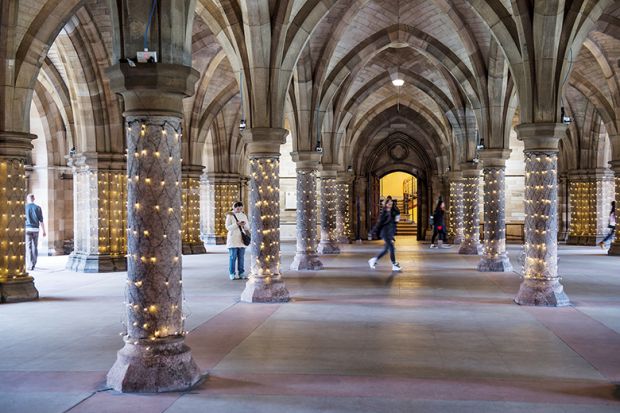Browse the full Times Higher Education Europe Teaching Rankings 2018 results
The University of Glasgow has been responsible for a series of huge breakthroughs in research in recent years. From the discovery of gravitational waves in 2015 to spearheading the global fight against the Zika virus, our researchers have been taking forward groundbreaking work for which our university has been rightly lauded.
And whether it’s these types of set-piece breakthroughs or the world-leading work that we continue to undertake in new and emerging areas such as precision medicine and quantum technology, we are immensely proud of the social and economic impact of so much of what we do.
But while it may be our research breakthroughs and wider impact that garner headlines, we have never lost sight of the fact that teaching must always be at the very core of everything that we do – it is central to providing a world-class student learning experience and developing the skilled, innovative and motivated graduates that our society needs.
Our learning and teaching strategy lies at the heart of our approach. It sets out a range of objectives and methods of ensuring that we continue to provide the best possible learning environment by supporting and empowering our students to develop into independent learners.
Indeed, empowering our people – both staff and students – is a key objective of the strategy, which seeks to allow our community to collaboratively invest their talent and expertise in the learning and teaching environment.
A key element of our approach has been to ensure that teaching is recognised and rewarded by providing parity of esteem for teaching even in a research-intensive environment, modernising our promotions processes and recognising the many outstanding contributions of colleagues through our teaching excellence and student-led teaching awards.
Academic colleagues are also supported to develop their practice through the provision of enhanced continuing professional development at all stages of their careers, and our professional services provide improved administrative support to teaching staff.
But of course, our academic and professional colleagues are only one side of the equation – and our vision is one in which our students feel empowered to be fully involved in the academic community.
We make extensive use of survey information, metrics and student feedback to understand the student perspective at Glasgow and this allows us to work with our students to design more effective learning experiences. At the heart of this is a strong partnership with the student body and a culture of openness allowing us to properly understand and address challenges in the learning environment.
Recognising that this culture has not always existed in the past, we have sought to work more closely with our elected Students’ Representative Council on policy development and on engaging students in the co-creation and evaluation of the overall learning experience.
A vibrant, active, engaged relationship between students and academic and professional colleagues is vital to bring out the best in both parties – and I am glad that at Glasgow, the view of students as merely passive users of teaching dispensed by academic staff has been left firmly in the distant past, where it belongs.
Agility is another vital aspect to our learning and teaching strategy, which sees us embrace innovation in both the delivery and support of teaching, and in developing our physical infrastructure.
We are currently in the midst of a £1 billion development of our main campus, which will allow students and staff to benefit from a physical environment very much focused on enhancing the learning experience for our students; our first major project in this development is a new learning and teaching hub.
Running throughout our campus development plans is our commitment to ensuring that students benefit from the best possible technologies from IT infrastructure to digital learning spaces. We are also committed to empowering our colleagues to personalise the educational experience and engage students in active learning.
In a competitive international higher education sector, students are increasingly, and rightly, expecting their universities to provide the highest-quality overall experience, and to provide access to leading research facilities to support their work.
By taking serious, concrete steps to foster a strong learning environment and focusing on the synergy between research and teaching, we are able to ensure that we remain at the forefront of effective pedagogy – benefiting students and staff, and contributing to an outstanding research environment.
This synergy between research and teaching will be the essence of the success of universities in the years to come. I am convinced that the steps Glasgow has taken to ensure that teaching is always at the heart of the university mission, and never comes to be seen as a poor relation to research activity, should become the norm in the sector.
Sir Anton Muscatelli is principal and vice-chancellor, University of Glasgow.
POSTSCRIPT:
Print headline: Core strength
Register to continue
Why register?
- Registration is free and only takes a moment
- Once registered, you can read 3 articles a month
- Sign up for our newsletter
Subscribe
Or subscribe for unlimited access to:
- Unlimited access to news, views, insights & reviews
- Digital editions
- Digital access to THE’s university and college rankings analysis
Already registered or a current subscriber?










